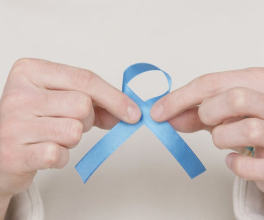
Grandpa George’s Legacy: Knowing Is Half the Battle
It’s not clear if ‘Grandpa George’ knew of his potential risk for colorectal cancer (CRC). He succumbed to the disease in 1948 at 39, just a few years after his return home from serving in World War II on a submarine. Alex Lenz’s father—then a young boy who lost his hero with barely a year’s worth of memories of George—later came to suspect a hereditary condition may be lurking in his family’s genes. He sought answers.
Early adopter for genetic testing
“He was always interested in everything that was changing in the world of science,” recalled Lenz, Senior Operations Manager at Olympus. When genetic testing became available at Massachusetts General Hospital (Boston), “he was basically the first in line to get it,” Lenz said of his father, who had a PhD in organic chemistry from the University of Chicago. The test was positive for hereditary nonpolyposis colon cancer (Lynch syndrome), which is associated with a substantial risk of CRC, and depending on the variant, a risk of other primary cancers such as gastric, ovarian, prostate, brain, and skin cancer.1
A motivator for action
Lenz’s father knew the odds. “You need to get checked, because there’s a 50% chance that I passed it on to you and your sisters,” Lenz recalled him saying. It seemed he wanted his offspring prepared for what he would endure. “My father’s first cancer when he was diagnosed at the age of 52 was colon cancer; however, he ended up having four more primary cancers over the course of 22 years,” said Lenz. “My uncle, who is currently 78 years old, had…colorectal cancer too, and now his fourth cancer is prostate stage IV, and that is what he’s battling right now.” Lenz said his uncle has also tested positive for Lynch syndrome.
It's an inheritance no one wants, but Lenz jokes that the old “knowledge is power” G.I. Joe adage fuels his approach to take life head on. “I went ahead and got tested, too … I have it.” He readily admits it was a gut punch, but he wasn’t down for long.

George Lenz, Jr. (left) pictured with his father George Lenz, Sr. (aka ‘Grandpa George’) in 1943.
One day of wallowing, then a lifetime of fighting
“I gave myself 24 hours to wallow, and feel it, and come up with a path forward,” said Lenz. That was roughly 20 years ago. Since then, Lenz’s path forward has been a vigilant one. “Preventative maintenance is the most important thing on the planet,” said Lenz. “I started getting colonoscopies 20+ years ago, every year. I get an endoscopy every other year. I get skin checks, I get an ultrasound, bloodwork, the whole nine yards, because early detection and screening could cut cancer off at the knees, potentially, so I’m doing everything I can to prolong my life.”
Fight or flight? Both
Quite literally, “I’m trying to outrun this potential diagnosis,” said Lenz. “I started running, and biking, and swimming, and over the course of the last 15 years or so, I’ve done a whole pile of marathons [and] Ironman triathlons,” said Lenz. “I think the healthier I can be now, as I turn 50 … the better it will set me up for future battles to come that are unseen.”

Alex Lenz, Senior Operations Manager, Olympus, cycling through the Frances A. Crane Wildlife Management Area on Cape Cod, Mass.
Serendipitous job at Olympus
Lenz says that landing at Olympus is “kind of serendipitous” given his genetic predisposition and the endoscopic technology the company develops. His inspiration to amplify his advocacy of CRC awareness and screening was fueled in part by the James Casey story. “I have seen him perform many times during the course of my lifetime,” said Lenz. “He was a phenomenal gentleman, a great man, and a great musician to see live. Such an amazing talent to have lost so young.” The saxophonist was diagnosed with stage III CRC at 38 and partnered with Olympus to advocate for awareness of family health history and CRC screening. He died in August 2023 at age 40.
Lenz, reflecting on his milestone birthday, added, “I have a voice and I’m not afraid to use it. I think getting screened early and often is the best preventative maintenance you can do because colon cancer [is] on the rise, it’s hitting people younger, and it’s preventable.”2
As for his personal motivations, “I have three kids I want to see grow up,” said Lenz. “This is my story. I’ve got this thing. I’m not letting it get me down because there’s a lot to do and see in this world and I feel like I’m just getting started.”
Ready to get started with colon cancer screening? Learn more about getting a colonoscopy and read more stories to inspire and motivate you!
Does CRC run in your family? Find out more about managing risk and getting answers.
Get more resources on Lynch syndrome, including podcasts, blogs, and links to support communities.
References
1. Sherman S, Ojha SK, Menon G, et al. Hereditary Nonpolyposis Colon Cancer (Lynch Syndrome) [Updated 2025 Jan 19]. In: StatPearls [Internet]. Treasure Island (FL): StatPearls Publishing; 2025 Jan-.
2. Cancer.org Key statistics for Colorectal Cancer. Accessed July 21, 2025.





